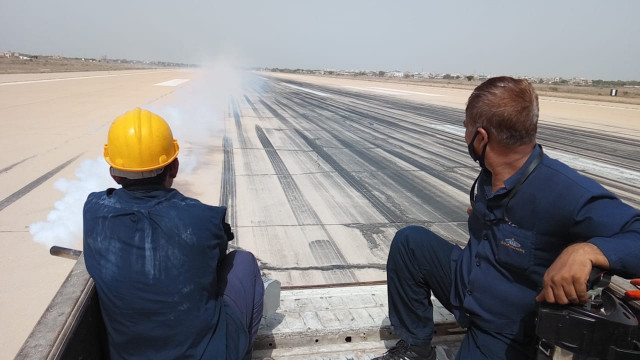Fearing aircraft damage CAA launches anti-locust spray campaign at Jinnah Terminal
Central and secondary runways, nearby areas among those being sprayed

Insecticide is sprayed on the runway to fend off locusts. Photo: Express/Courtesy CAA
A spray campaign was launched on the central and secondary runways, and insecticide is also being sprayed in the areas surrounding the runway, according to CAA officials. These include the approach areas, boarding bridges and aircraft parking areas.
The officials maintain that locusts can cause major damage to aircraft and insecticide sprays will be carried out daily given the locust threat in Sindh.
Besides, they add, there are concerns of the presence of large birds due to locusts and measures are being taken to protect planes from accidents and damages.
Climatic events such as locust attacks and dust storms have prompted special measures at the airport in the past week.
Earlier this week, private jets and helicopters parked at the airport were anchored with weights as strong winds battered the city on Wednesday night, as small aircraft are more susceptible to damage during storms.
Locust threat looms
Meanwhile, according to a report submitted before the Supreme Court recently by the Punjab government, the threat of attacks by desert locust looms over the entire country.
The report states that 37 per cent land area in the country is more vulnerable to the attack - this vulnerable area is comprised of 60 per cent area in Balochistan, 25 per cent in Sindh and 15 per cent in Punjab.
“If the desert locust are not contained, Punjab and Sindh may become the summer breeding zones for the pest,” stated the report.
Farmers in Pakistan’s main food-producing pockets have been haunted by a plague of locust swarms which are sweeping green fields with their devastating instinct to eat heavily.
Locust swarms triggered panic among villagers in Punjab as their crop was fine one evening but a lot of leaves had been eaten up a day later. They fear that if the situation prevails it would finish all cash crops, animals’ fodders and fruits like it did with wheat crop in Sindh.
According to the Sindh government, 22 districts in Sindh have been affected by locusts in recent weeks. The provincial government had reportedly added 41 more teams to its anti-locust fleet last month, and remains fearful of major locust invasions heading its way soon.
Highlighting the threat of breeding locusts in the monsoon season, Sindh Agriculture Minister Ismail Rahoo said on June 4 that the Centre has yet to initiate aerial spraying.


















COMMENTS
Comments are moderated and generally will be posted if they are on-topic and not abusive.
For more information, please see our Comments FAQ